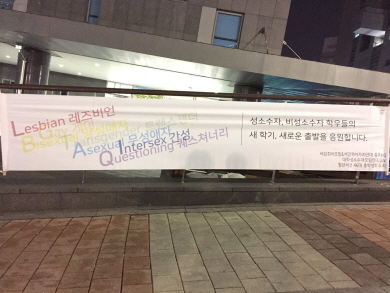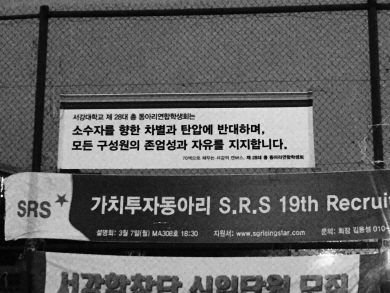
Movements regarding sexual minorities have been active on university campuses on both sides: students fighting for LGBT rights and opponents consistently objecting to it. Amid rising tensions, homophobic terrorisms aimed at school queer clubs broke out in universities. Students including members of queer clubs, are working in joint to take actions against vandalisms and promote LGBT rights. In this issue, Ewha Voice will cover the events and movements concerning Sogang University’s “Dancing Queers.”
Hate crimes targeting LGBT clubs and activities on campus happen every year. Even though members of the clubs have taken steps to handle the situation, the conflict has continued.
Solidarity for Queer Liberation at Sogang University, “Dancing Queers (Dancing Q),” suffered damages from hate crime. On March 1, a banner put up by Dancing Q to greet freshmen was discovered in a garbage can, apparently damaged by a knife. The banner contained a message welcoming all freshmen to Sogang regardless of their sexualities, from heterosexual to lesbian, gay, transgender, asexual and intersex. However, in less than a day after the installment, the banner was deliberately damaged and discarded.
Upon discovering the acts of vandalism, Dancing Q checked the CCTV footage to identify the culprit. Shockingly, it was confirmed that the person who intentionally damaged the banner was no other than a professor from their own school.
“We were astonished to learn that a professor would do such a thing,” remarked a member of Dancing Q. “But, we were also determined to thoroughly prepare for the aftermath after confirming who we were going against.”

Firmly resolved to take strong measures, Dancing Q demanded an official explanation and a public apology from the professor by noon on March 10; it notified that if the professor fails to meet the request, the club would conduct joint actions with the student government, make the matter public through the media and file charges.
However, on March 9, the media revealed that the professor refused to apologize, claiming that he tends to remove messy things. He also added that he had a dislike for the content as well, saying “It felt more like an advertisement than a greeting. Why should only those mentioned on the banner be welcomed?”
As Dancing Q received neither an apology nor an explanation from the professor, its members visited the Mapo police station to sue the professor on March 10. It also carried out joint actions with the student government, posting handwritten posters around the campus.
On March 14, the professor finally made an apology to the club. However, he claimed that he could not find a permit sticker on the banner, which was why he took the banner off. It was later confirmed that the sticker was in fact attached.
Currently Dancing Q is taking additional measures, which include “messy banner” project (a project where the student government of the school and each department put up banners to support Dancing Q and its stance on students’ rights), and sending an official document to the school requesting the punishment of the professor and enactment of measures to prevent a recurrence of similar incidents.
The official document is mostly about the promotion of students’ rights: to include LGBT rights education for faculty members and staffs, to establish specific school regulations to prevent and respond to hate crimes, and to create an institution within the school that deals with students’ diversity and human rights.
“When a posting about the vandalism that targeted the queer club in Seoul National University was uploaded on a website called Pikicast, many people wrote comments such as ‘Queer clubs actually exist’ and ‘I didn’t know such crimes really happen,’” Dancing Q said. “It is sad that we were known to the public through hate crimes. However, we think it is good that people are becoming aware of the rights of sexual minorities, and getting to know how we are standing up to oppression.”

